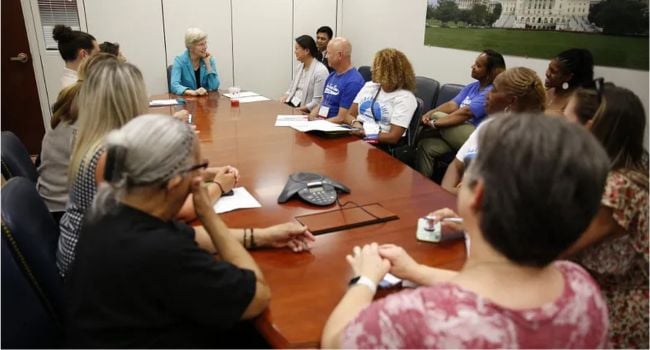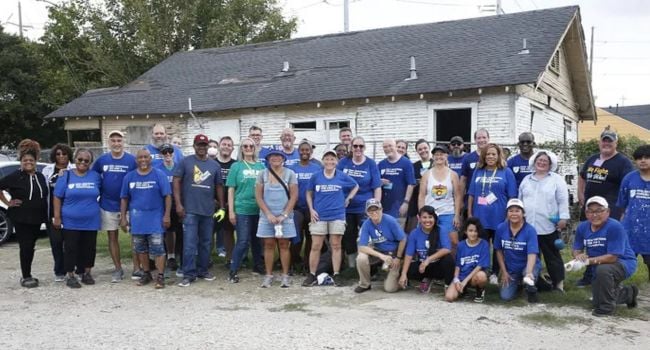Overwhelming. It’s a word that comes up a lot these days, as we face blow after blow to the infrastructure we thought we could count on. Funding for medical science is disappearing. Student loans that make college possible for millions of students could dry up. Diversity, equity and inclusion efforts have been shut down. The president is turning national troops on our own people. Outside the realm of education, Republicans are set to snatch away Medicaid and the Supplemental Nutrition Assistance Program, two programs that are lifelines for many families.
What can we do? Take action. It not only conveys resistance, it builds community and makes us more powerful for the fight. Here are eight things you can do right now.

Write to Your Senators
As we write this post, one of our top concerns is the tax reconciliation bill the Republicans are trying to push through, complete with harmful cuts to education as well as to Medicaid and SNAP. Calling or writing your senators is one of the most effective things you can do to control the damage, and if this bill has come and gone by the time you read this, know that staying in touch with elected officials is always a good idea. Click here to get started on a letter about the reconciliation bill, and read on for actions that will continue to be relevant long after the bill passes.

Share on Social Media
The AFT has an active presence on Bluesky, Instagram, Facebook, Threads, YouTube and Linked In, and we also keep you informed by text. It’s easy to join in: Just follow the AFT (you’ll find links to our accounts at the bottom of our home page and you can sign up for texts on our mobilization page) and learn about the latest, most relevant actions and online events, like panel discussions, webinars, virtual town halls, book talks, podcasts and more. Share the events, post comments, repost and join our e-Activist team to make the timeliest impact.

Meet with Elected Officials
Members of Congress have local offices where you can schedule a meeting with your elected representatives and/or their staff to share your positions on crucial issues.

Summer is a great season to connect with them on your home turf, and some of our AFT affiliates are organizing those visits right now. Many AFT locals schedule lobby days at the state level during legislative sessions, too, traveling en masse to meet with state legislators. There is power in our collective voice!

Get Out in the Streets and Demonstrate
Showing up and making noise is a powerful way to demonstrate solidarity and amplify our message, and the AFT has been on the frontlines of protests across the country. We believe the increase in demonstrations is showing policymakers that they cannot ignore their constituents, and it is building the community we will need to continue to fight against bad policy and for working families. This video of AFT members in the streets for the “No Kings” protests and this one from the “Hands Off!” day of action will get you pumped up for the next event. Learn more about what you can do at our mobilization page.

Carve Out 20 Minutes A Day for Activism
You can write or call your elected representatives and other movers and shakers, whether they are senators, city council members or homeowners association activists. Post on social media about the issues that matter to you: Sign up to be a digital activist or a worksite political lead on our AFT Votes page. Look at that petition that is circulating to provide a gender-neutral bathroom at your library. Organize a departmentwide postcard-writing party or suggest an educational townhall for your colleagues — or your whole town — to address an issue you need to learn more about.

Get Involved at Home
National politics and policy can feel overwhelming, but engaging at the local level can make a huge difference, too. Check out what is happening in your own workplace and in your own union. Does your contract have equity and inclusion protections? What about free speech protections?

Is your school administration, healthcare facility or public office dialing back Black History Month and funding for diversifying the staff? Advocate for what you believe in at every level — and don’t forget nonwork opportunities like the PTA at your child’s school, the neighborhood listserv or your town council. While working to save SNAP is important, so is volunteering at your local food bank.

Connect with Student Organizations
If you are an educator, you know we are here for our students, so we must be sure to listen to them as we travel through these dangerous times. What do they need most? How are they being harmed by changing policy? How can we follow their lead, incorporate their ideas and energy into our own campaigns and find other ways to partner with them? Remember, we are stronger together.

Keep Teaching
Calling all educators: To protect academic freedom, we must practice using it. Be sure your union contract language protects your freedom to teach as you see fit, without ideological constraints — and if it doesn’t, work with your union siblings to change that.

If you are in a safe position to do so, keep teaching difficult topics, be inclusive and remain open to a broad spectrum of ideas for discussion. Your union has your back.

Educate Yourself
Stay on top of the news that most concerns you. Follow your local, state and federal elected officials on social media and on their websites to see how they are voting and what issues they are prioritizing. Stay informed through trusted media sources. Keep up with the AFT’s news sources: At aft.org you’ll find press releases, statements, news stories, our AFT Voices blog and President Randi Weingarten’s columns. Sign up for our e-newsletters. Read through our Defending Higher Education links. When you have a deeper well of knowledge about an issue, you will be more confident as you share what you know and advocate for change.
Subscribe to Our Newsletter
Want to see more stories like this one? Subscribe to the SML e-newsletter!
Republished with permission from AFT Voices.











